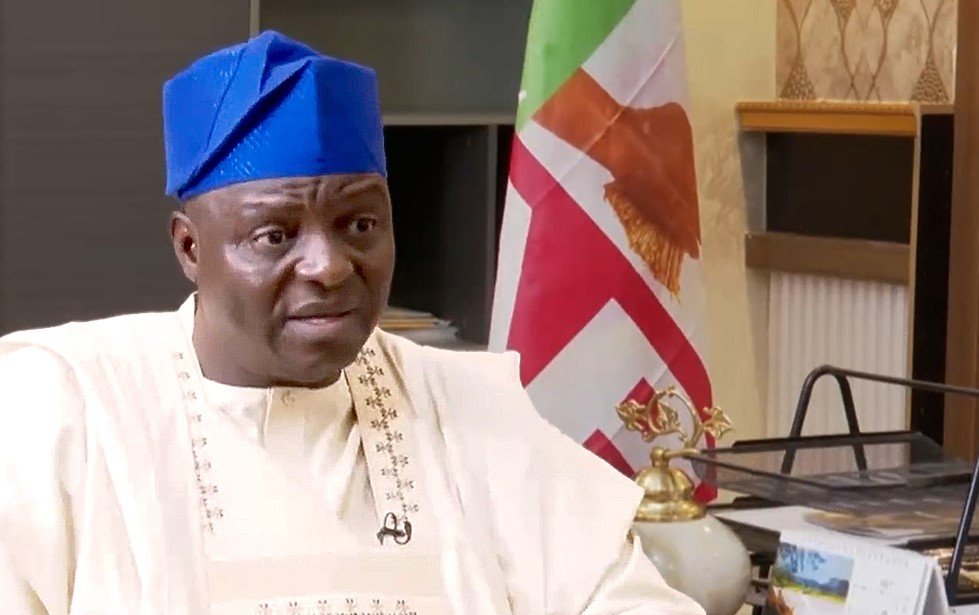THE All Progressives Congress (APC) has defended the appointment of Prof. Nentawe Yilwatda, the former Minister of Humanitarian Affairs and Poverty Reduction, as its new national chairman, amid widespread criticism and concern from opposition parties over his previous role with the Independent National Electoral Commission (INEC).
News Point Nigeria reports that Yilwatda’s emergence was ratified during the National Executive Committee (NEC) meeting of the ruling party, held at the Presidential Villa, Abuja, on Thursday, July 24, 2025.
He replaces former chairman, Dr. Abdullahi Ganduje, who stepped down on health grounds.
The former academic, who once lectured engineering at the Federal University of Agriculture, Makurdi, was appointed Resident Electoral Commissioner (REC) for Benue State in 2017 and served until 2021.
During his tenure, he was involved in the conduct of elections in several key states, including Benue, Anambra, Osun, Rivers, and Cross River.
Yilwatda later contested the 2023 governorship election in Plateau State under the APC, and although he initially secured victories at the tribunal and the Court of Appeal, the Supreme Court upheld the election of Governor Caleb Mutfwang.
The announcement of Yilwatda’s new role has been met with alarm by major opposition voices who argue that his past affiliation with INEC raises significant questions about the electoral umpire’s neutrality and the broader implications for Nigeria’s democracy, particularly as the 2027 general elections draw closer.
Diran Odeyemi, a member of the National Executive Committee of the Peoples Democratic Party (PDP), did not mince words.
“Yilwatda’s appointment has again exposed who he truly is. His
“DNA is clearly APC. This reinforces doubts about his neutrality during his INEC years and throws a dark cloud over the future of our electoral integrity,” Odeyemi said.
The PDP chieftain went on to describe the development as part of a pattern of co-opting state institutions for partisan political ends.
While not as scathing, the Young Progressives Party (YPP) took a more measured stance.
Its National Publicity Secretary, Wale Egbeola-Martins, acknowledged the concerns but stressed that Nigeria’s greater challenge lies in weak electoral laws rather than individual affiliations.
“The integrity of our democracy cannot rest solely on personalities. It must be underpinned by strong legal safeguards. That is why we are pushing for urgent and thorough reforms of our electoral laws,” he said.
According to Egbeola-Martins, focusing solely on appointments ignores the structural flaws that continue to undermine Nigeria’s democratic processes.
The Coalition of United Political Parties (CUPP) was even more direct in its criticism. National Secretary Peter Ameh described Yilwatda’s appointment as a calculated threat to democratic institutions.
“This is not just a political appointment. It is a dangerous signal. It undermines the very essence of free and fair elections.
“How do we assure Nigerians that INEC is truly independent when one of its former senior officials now chairs the ruling party?” he queried.
Ameh warned that allowing such fluid transitions between regulatory bodies and partisan politics would only deepen public distrust and increase voter apathy.
“Yilwatda’s journey from INEC to the APC is not just troubling, it’s a red flag for what’s to come,” he added.
In response to the mounting criticism, the APC Director of Publicity, Bala Ibrahim, dismissed the concerns as misplaced and politically motivated.
“Are political parties not allowed to employ former INEC staff? Is INEC a cult? Even retired police officers become security consultants. This outrage is unnecessary and hypocritical,” he stated.
According to Ibrahim, Yilwatda’s knowledge of electoral systems could only be an asset not a liability for the APC.
“The man has no access to INEC facilities or resources. His experience will help us play by the rules, not break them. The opposition is free to hire similar talent,” he said.
A legal analyst, Ibrahim Inuwa Dabo told News Point Nigeria that the real concern is not necessarily about Yilwatda himself, but what his appointment symbolizes.
“In a nation where elections are often contested amid allegations of rigging, violence, and voter suppression, public perception of neutrality is everything”.
“With less than two years to the next general election, critics argue that the ruling party’s decision to bring a former INEC official into its top leadership feeds an already growing narrative of electoral manipulation”, the Dabo concluded.
Whether the fears are founded or not, one thing is clear: Prof. Yilwatda’s new role has reignited an urgent national debate about electoral integrity, transparency, and the thin line between state institutions and partisan politics.







